Thales Of Miletus: One Of The Famous “Seven Sages Of Greece” Who Predicted A Solar Eclipse
A. Sutherland - AncientPages.com - Thales of Miletus is counted among the seven sages of ancient Greece. He is considered the father of Greek mathematics, as well as the first European scholar and philosopher.
Many theorems in geometry are attributed to him, including the so-called ‘theorem of Thales’. Thales was described by Aristotle (384–322 BC) one of the greatest philosophers of all time, as the founder of the Ionic Philosophy, and so the founder of Greek Philosophy as a whole.
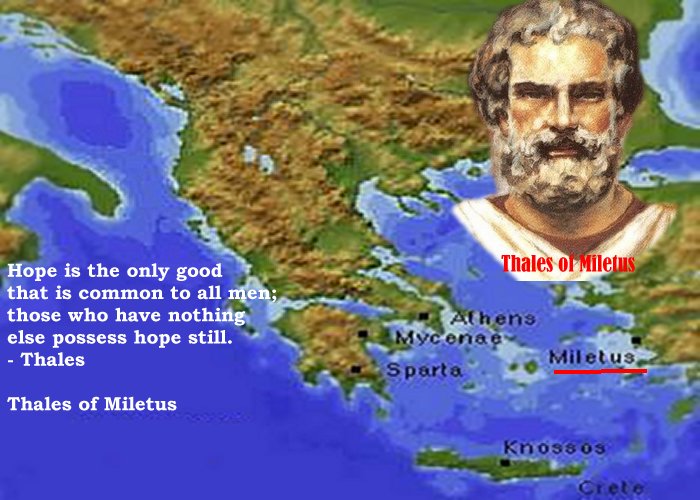
He is renowned for correctly predicting a solar eclipse, figuring out how to measure the height of the pyramids in Egypt, calculating the real length of a solar year to a high degree of accuracy, and also for many other achievements in fields of philosophy, mathematics, and engineering.
He marked the beginning of one the oldest and finest philosophy - the Greek Philosophy.
The Ionic School was represented by pre-Socratic group of Greek philosophers of the 6th and 5th century BC; most of them were born in Ionia, an ancient region of central coastal Anatolia in present-day Turkey, the region nearest İzmir, which was historically Smyrna. These philosophers focused their minds on the beginnings of the universe, the forces which shaped it and the materials of which it is composed.
Thales believed that "all things were full of gods" and called the soul the principle of movement. He believed in the immortality of the soul. He observed things, thought about them intensely and used his tool of reasoning to explain many things.
Thales lived in the city of Miletus, which is current day Milet in Turkey), and was highly respected across Asia Minor. His extensive knowledge of astronomy indicates that he was educated at some point in Egypt or Babylon, the major centers of education.
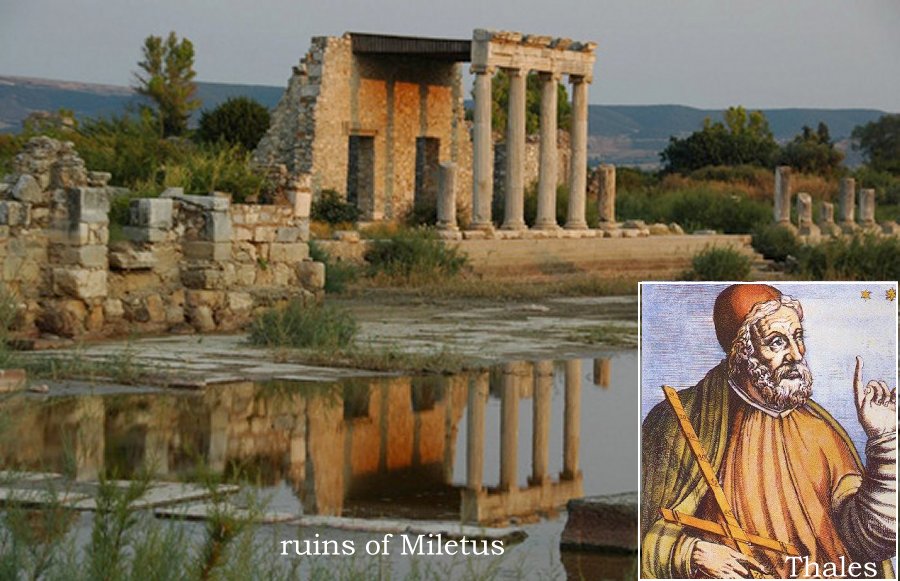
With no apparatus, Thales was able to state that earth floated in water. He was able to predict solar eclipses. It was Thales who began to put an end to the false belief that earth was flat. According to Aristotle, Thales believed that earth was spherical.
For a certain period of time, he lived at the court of the King of Lydia, and it was during a battle between Lydia and Medes in 585 BC, that he famously predicted an eclipse of the sun on eve of great battle.
The phenomenon passed over the battle field and gave a strong uncanny sensation of approaching disaster. The combatants saw the eclipse as disapproval of their warfare, and as a warning, they felt great fear and anxiety They ceased fighting and a peace agreement was reached between the two kings.
The prediction of a solar eclipse by Thales was one of the most remarkable events, which was widely celebrated among Thales’ contemporaries and it has surprised modern scholars as well. However, there are no ancient accounts that explain his great achievement and modern attempts to reconstruct Thales’ approach to the phenomenon – unfortunately failed.
Moreover, it has long been argued that any reliable prediction of a solar eclipse was impossible before Hipparchus of Nicea (190 BC - 120 BC), an ancient Greek mathematician, astronomer and geographer, regarded by many historians as the greatest astronomical genius among the ancient Greeks.
The fact remains that the eclipse did occur within the period Thales accurately specified. How Thales foretold the eclipse is not known.
Modern astronomy confirms that the eclipse did occur, and was total.
Thales is also well-known for figuring out how to measure the height of the pyramids in Egypt, how to calculate the real length of a solar year to a high degree of accuracy, and many other achievements in fields of philosophy, mathematics, and engineering.
Written by – A. Sutherland - AncientPages.com Senior Staff Writer
Copyright © AncientPages.com All rights reserved. This material may not be published, broadcast, rewritten or redistributed in whole or part without the express written permission of AncientPages.com
Expand for referencesMore From Ancient Pages
-
 On This Day In History: The Battle Of The Nile Concludes In A British Victory – On August 2, 1798
News | Aug 2, 2016
On This Day In History: The Battle Of The Nile Concludes In A British Victory – On August 2, 1798
News | Aug 2, 2016 -
 Leprechaun: One Of The Most Famous And Powerful Creatures Of The Irish Faerie Folk
Celtic Mythology | May 8, 2016
Leprechaun: One Of The Most Famous And Powerful Creatures Of The Irish Faerie Folk
Celtic Mythology | May 8, 2016 -
 Lost Maya City Hidden In The Volcanic Lake Atitlán Explored By Underwater Archaeologists
Archaeology | May 4, 2022
Lost Maya City Hidden In The Volcanic Lake Atitlán Explored By Underwater Archaeologists
Archaeology | May 4, 2022 -
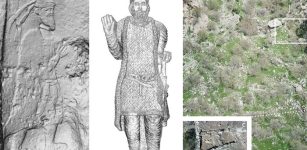 Mysterious 2,000-Year-Old Lost City Of Natounia May Have Been Found!
Archaeology | Jul 20, 2022
Mysterious 2,000-Year-Old Lost City Of Natounia May Have Been Found!
Archaeology | Jul 20, 2022 -
 Historic Shipwreck Mentor Reveals Its Underwater Secrets
Archaeology | May 14, 2022
Historic Shipwreck Mentor Reveals Its Underwater Secrets
Archaeology | May 14, 2022 -
 5th-Century Tomb With Finds Of Historical And Artistic Value Discovered In Eastern Bohemia
Archaeology | Mar 8, 2021
5th-Century Tomb With Finds Of Historical And Artistic Value Discovered In Eastern Bohemia
Archaeology | Mar 8, 2021 -
 Controversial Sand Mounds In Australia Are 6,000 Years Old Man-Made Burial Mounds – Radar Scans Reveal
Archaeology | Feb 10, 2018
Controversial Sand Mounds In Australia Are 6,000 Years Old Man-Made Burial Mounds – Radar Scans Reveal
Archaeology | Feb 10, 2018 -
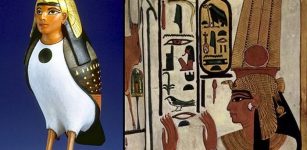 Why Were Ba And Ka Powerful Elements Of Soul In Ancient Egyptian Beliefs?
Egyptian Mythology | Apr 21, 2020
Why Were Ba And Ka Powerful Elements Of Soul In Ancient Egyptian Beliefs?
Egyptian Mythology | Apr 21, 2020 -
 Carved Stone Depicting Mystery Horseman Unearthed At Roman Vindolanda, Hadrian’s Wall
Archaeology | Jul 1, 2021
Carved Stone Depicting Mystery Horseman Unearthed At Roman Vindolanda, Hadrian’s Wall
Archaeology | Jul 1, 2021 -
 King Geirrod Betrayed His Brother Agnar And Sent Him To Die But Justice Finally Prevailed
Featured Stories | Feb 14, 2024
King Geirrod Betrayed His Brother Agnar And Sent Him To Die But Justice Finally Prevailed
Featured Stories | Feb 14, 2024 -
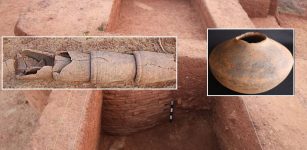 2,000-Year-Old Trade Center: Brick Structure, A Vishnu Sculpture Among Findings In Andhra Pradesh
Archaeology | Nov 6, 2019
2,000-Year-Old Trade Center: Brick Structure, A Vishnu Sculpture Among Findings In Andhra Pradesh
Archaeology | Nov 6, 2019 -
 Cacao Originated 1,500 Years Earlier Than Previously Thought And Comes From South America
Archaeology | Oct 30, 2018
Cacao Originated 1,500 Years Earlier Than Previously Thought And Comes From South America
Archaeology | Oct 30, 2018 -
 A 2,500-Year-Old Marble Disc, Designed To Protect Ancient Ships And Ward Off The Evil Eye – Discovered
Archaeology | Aug 4, 2023
A 2,500-Year-Old Marble Disc, Designed To Protect Ancient Ships And Ward Off The Evil Eye – Discovered
Archaeology | Aug 4, 2023 -
 Evidence Of The Moon-Eyed People – More Clues – Part 2
Civilizations | Dec 29, 2019
Evidence Of The Moon-Eyed People – More Clues – Part 2
Civilizations | Dec 29, 2019 -
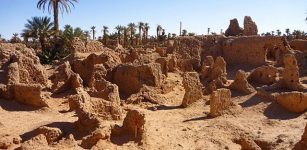 Mystery Of 3,000-Year-Old African Civilization Garamantes And Its Ancient Secrets
Archaeology | Feb 16, 2015
Mystery Of 3,000-Year-Old African Civilization Garamantes And Its Ancient Secrets
Archaeology | Feb 16, 2015 -
 Ancient Necropolis With Lead Coffins Sheds Light On Early Christian Funeral Practices
Archaeology | Jul 13, 2020
Ancient Necropolis With Lead Coffins Sheds Light On Early Christian Funeral Practices
Archaeology | Jul 13, 2020 -
 Unexplained Mystery Of The Untraceable Stone-Throwers – Strangeness In North America, Belgium And Indonesia – Part 1
Featured Stories | Nov 11, 2019
Unexplained Mystery Of The Untraceable Stone-Throwers – Strangeness In North America, Belgium And Indonesia – Part 1
Featured Stories | Nov 11, 2019 -
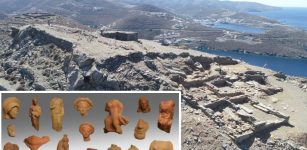 Over 2,000 Clay Figurines Discovered In The Ancient City Of Kythnos
Archaeology | Jun 10, 2023
Over 2,000 Clay Figurines Discovered In The Ancient City Of Kythnos
Archaeology | Jun 10, 2023 -
 Evidence The Khufu Channel Aided The Construction Of The Giza Pyramids Found – Scientists Say
Archaeology | Aug 31, 2022
Evidence The Khufu Channel Aided The Construction Of The Giza Pyramids Found – Scientists Say
Archaeology | Aug 31, 2022 -
 Massive Bronze-Age Settlement Discovered Underwater in Greece
News | Sep 1, 2015
Massive Bronze-Age Settlement Discovered Underwater in Greece
News | Sep 1, 2015
